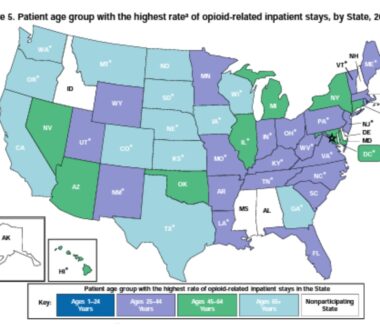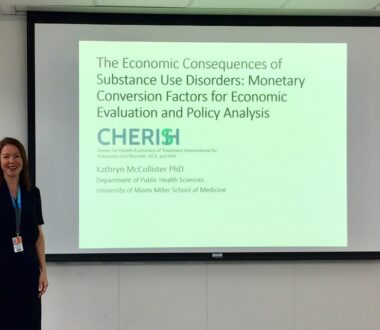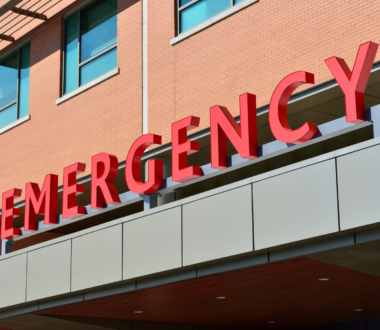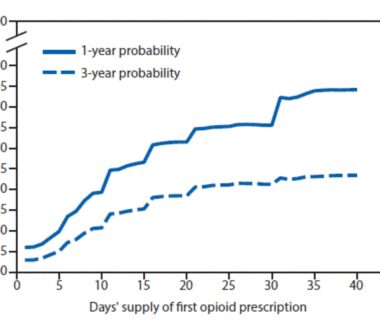
Increased Opioid-Related Inpatient stays and ED Visits
A recent statistical brief from the Agency for Healthcare Research and Quality (AHRQ) provides valuable information regarding patient characteristics for opioid-related inpatient stays and emergency department (ED) visits in the US and within 44 states and the District of Columbia. The brief comes from AHRQ’s Healthcare Cost and Utilization Project (HCUP), which is the largest all-payer encounter-level collection […]

Monetary Conversion Factors for Evaluating Substance Use Disorder Interventions: New Resource for Researchers
The National Institute on Drug Abuse estimates that substance use disorders, comprising illicit drugs and alcohol use as well as smoking, cost the United States more than $740 billion per year. This includes the cost of crime, incarceration, lost productivity, and medical care. A recent study considered the economic consequences of heroin use specifically, finding […]

Medications for Opioid Use Disorder: Who is Receiving Which Treatment?
In response to the growing opioid epidemic in the United States, there is an increased focus on expanding evidence-based treatment using medications prescribed for substance use disorder, especially medications that can be prescribed in outpatient settings including buprenorphine and naltrexone. The Surgeon General’s report on facing addiction in America describes substance use disorders as chronic illnesses requiring […]

The Older Face of the Opioid Epidemic
In a recent report, the CDC tracks drug overdose deaths in the US between 1999-2015. The trends are not exactly what you might expect. Yes, given the recent press attention to the US opioid epidemic, the rates are predictable in that they are unacceptably high and increasing at a shocking rate. Age-adjusted drug overdose rates increased to 16.3 […]

Opioid-Prescribing Patterns of Emergency Physicians and Risk of Long-Term Use: Evidence from Medicare and Private Insurers
In 2015, over 20,000 Americans died of an overdose related to prescription pain relievers; approximately 1 person every 26 minutes. A study recently published in the New England Journal of Medicine highlights the correlation between emergency department prescribing practices and long-term prescription pain reliever use in Medicare patients. The research team from the Harvard T. H. Chan School of Public Health […]

Prescriber Mandates in Prescription Drug Monitoring Programs
To address the crisis of opioid misuse, abuse, and overdose, every state but Missouri has implemented a prescription drug monitoring program (PDMP) that collects data from retail pharmacies on all dispensed controlled substances. PDMPs can help prescribers identify patients who might misuse or divert controlled substances, as well as patients who need substance abuse treatment. […]

A Frightening Chart on Opioids
The danger of that first prescription “Just in case,” the oral surgeon said, as he prescribed the opioid hydrocodone for my 17-year-old son, who just had his wisdom teeth out. “But you might try Motrin first,” he added. Not knowing what the next hours, or days, would bring, we filled the prescription for 20 pills. […]

Substituting Heroin for Prescription Opioids
It seems self-evident: one way to address the epidemic of opioid deaths is to make prescription opioids harder to misuse. OxyContin, for example, is especially dangerous when it is crushed for ingestion, inhalation, or injection. In 2010, the FDA approved a reformulated, abuse-deterrent version of OxyContin that made the pill difficult to crush or dissolve. […]

Second Panel on Cost-Effectiveness in Health and Medicine
The US Panel on Cost-Effectiveness in Health and Medicine issued a report in 1996 that set the standards for reporting of cost-effectiveness studies in the field, resulting in a rapid expansion of publications and establishment of similar national standards in other jurisdictions. Twenty years later, the Second Panel on Cost-Effectiveness in Health and Medicine has […]

Medicaid’s Most Costly Outpatient Drugs include Opioids, Opioid Agonists, and HCV and HIV Treatments
The Kaiser Commission on Medicaid and the Uninsured recently released an issue brief detailing the most costly outpatient drugs to Medicaid in 2014 and the first half of 2015. Using data from the Center for Medicare and Medicaid Services (CMS), the authors analyzed outpatient drug costs based on Medicaid spending (before rebates) to determine which drugs account […]

Zachary Meisel Wins $2.1 Million PCORI Funding Award
University of Pennsylvania Assistant Professor of Emergency Medicine and LDI Senior Fellow Zachary Meisel, MD, has received a $2.1 million funding award from the Patient-Centered Outcomes Research Institute (PCORI). The award will fund a 36-month comparative effectiveness study of enhanced opioid risk communication strategies for pain management following acute care. Meisel’s research team includes LDI Senior Fellows Carolyn […]

Investigator Profile: Dr. Kathryn McCollister On Cost Effectiveness of Continuing Care for Cocaine Dependence
Dr. McCollister is an Associate Professor and Health Economist in the Department Public Health Sciences at the University Of Miami Miller School Of Medicine. She is the Co-Director of the CHERISH Methodology Core. This interview discusses her interest in substance use health economics and her most recent publication “Cost Effectiveness analysis of a continuing care […]
Engage with CHERISH
Submit a Consultation Request or Contact Us to learn more about how CHERISH can support your research or policy goals.